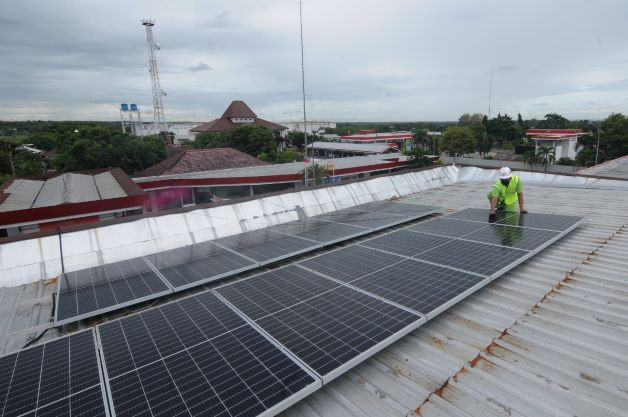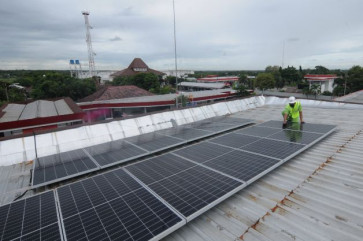Popular Reads
Top Results
Can't find what you're looking for?
View all search resultsPopular Reads
Top Results
Can't find what you're looking for?
View all search resultsPaving Indonesia’s energy-transition leadership
President Joko “Jokowi” Widodo’s second term is nearing its end, and seen from the public perspective, he wants to leave a strong legacy -- that probably includes the energy sector.
Change text size
Gift Premium Articles
to Anyone
 Saving energy: A worker cleans solar panels that generate electricity for a gas refueling station in Teras area in the Central Java regency of Boyolali on Oct. 26, 2022. The renewable energy is said to help the gas station operator save 10-15 percent of its monthly electricity bill. (Antara/Aloysuis Jarot Nugroho)
Saving energy: A worker cleans solar panels that generate electricity for a gas refueling station in Teras area in the Central Java regency of Boyolali on Oct. 26, 2022. The renewable energy is said to help the gas station operator save 10-15 percent of its monthly electricity bill. (Antara/Aloysuis Jarot Nugroho)

This month marks the first anniversary of putting rooftop solar on my childhood home, effectively slashing the electricity bill. It is a good investment, even when the net-metering tariff was still capped at 65 percent -- albeit the newest regulation, Energy and Mineral Resources Ministerial (MEMR) Regulation No. 26/2021, says it should be 100 percent.
The lagged implementation of said regulation is already a public secret and considered negligible, because a more-dire challenge exists: 15-percent capacity limitation (based on the building’s electricity installation). Since early this year, applications to install rooftop solar for consumers (residential to industrial) have been met with letters from the state electricity company PLN saying they can only install a portion of what they request. It does not matter if you are a residential consumer within the 4,400 VA category and want to install 4 kWp of rooftop solar -- you will only be given permission to install 600 Wp. Otherwise, you need to upgrade your electricity installation to 60,000 VA, if you insist on the same capacity of rooftop solar.
Tell me how this would make any sense -- and will it change following some big commitments made in the past few months leading up to the recent Group of 20 Summit?
Two big announcements concerning Indonesia’s energy transition were made on the sidelines of the G20 Summit in Bali on Nov. 14-15: the early kick-off for Energy Transition Mechanism (ETM) and Just Energy Transition Partnership (JETP).
ETM is an ADB-led market-based approach blended finance to transform power systems by accelerating coal-power plants’ retirement and boost clean-power capacity.
Together with Indonesian partners, ADB signed a memorandum of understanding (MoU) to retire a 660 MW coal-power plant in Cirebon, West Java. This “middle-aged” plant, 12 years old, is planned to be terminated by 2037 -- 15 years earlier than its 40-year conservative lifetime.
Emulating South Africa’s US$8.5 billion initiative to decarbonize its power sector, a coalition of countries led by the United States and Japan declared JETP, a commitment to mobilize $20 billion to help peak Indonesia’s power-sector emissions by 2030, including by shutting down coal power plans. The fund consists of grants and concessional loans. The US will work with Indonesian counterparts to establish a secretariat and make a plan within 90 days -- moving fast.


















